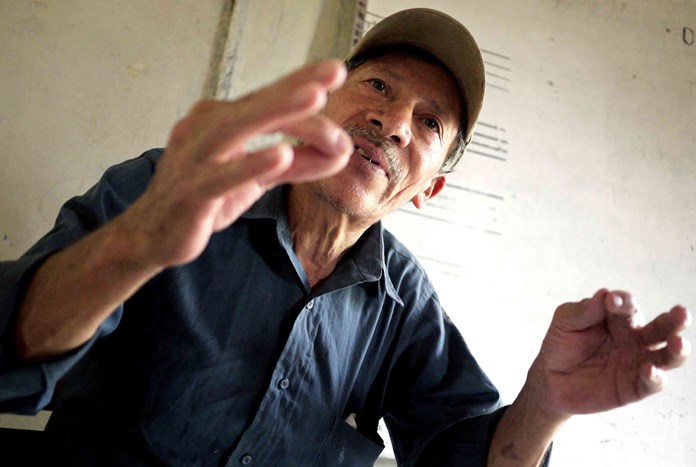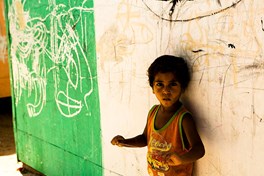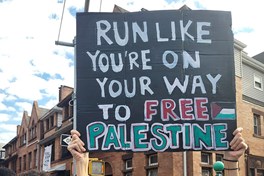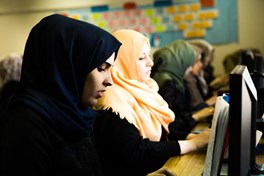Cepanna – Saturday morning
I have to write some things down or I will forget. It’s 6am, thirteen hours, five thousand miles from London, and an hour and a half from the nearest town as I wake early to a Nicaragua morning in Matagalpa. I am not likely to be here again so I get up and creep from the hut where we are sleeping, to go and see...
We arrived in the dark and could see nothing. Our rooms are in a brick hut with the corrugated roof open at the edges – tiny windows. This is a farm so the cacophony of noise since 5am has been ‘like a farmyard’ with howler monkeys sounding somewhere between a very loud arrogant cockerel to a kind of cow.
It’s very still at the moment and cool. Blade-like palm leaves are sliced with sunlight. Everything in the UK seems a lifetime away, probably in ways, it will take time to allow to sink in, to reflect. I am conscious of how much I am attached to things I think I need, or cannot let go.
Yesterday
In Teustepe at the CEPAD office and the new community project, Amos is going to support, I met people whose land had been devastated by massive unlicensed deforestation. We passed a huge truck on the road stacked with giant logs, its driver asleep on the road underneath. Three successive years of late, or no rain, has left the landscape parched, bleached of colour – trees like ghostly twigs – tinder dry.
The ground is dusty, stony; riverbeds and creeks dried, occasionally there are small wells a bit like bicycle wheels under a little roof painted bright blue or left rusty. Government men and industry leaders growing rice to sell to the US, have drained the two rivers and lake until they are muddy, dry flatbeds that you sink into as you walk on them.
We were shown photos of once full-flowing rivers, the contrast is stark. Now they are sluggish, arid, dying. Where there were thriving cattle, now they are skinny ribbed, long graceful horns and bodies a palate of beautiful umber, wheat white.
In a small concrete hut, where the church and community meet under a single light bulb, naked wires draped across beams; we met the community who will work with CEPAD and whom we will support.
In March they will begin their training, the first twelve – like disciples – in psycho-social work, advocacy, allotment growing – peppers, tomatoes. Later they will be moving to big farms. They live in two areas about 1km apart with a school midway between. It is run by two teachers who can leave nothing there at night or it will be stolen.
The ground is dusty, stony; river beds and creeks dried, occasionally there are small wells a bit like bicycle wheels under a little roof painted bright blue or left rusty. Government men and industry leaders growing rice to sell to the US, have drained the two rivers and lake until they are muddy, dry flatbeds that you sink into as you walk on them.
Teustepe town is 16km away – there is no bus. A private truck costs 400 NC and they have no transport except a bike, so they walk, always walk. The high school and the nearest health centre are in Teustepe. If anyone is sick in the night they have to hope they survive until morning when they can be carried there.
There are 83 members of this community and it is one of seven CEPAD will work with here. One man will coordinate the project and a committee of men and women all with different responsibilities –must learn to know and trust and like each other.
The work chosen depends on what priorities the community agrees on. To me, it seemed a vehicle would be really important. I realise how instinctively my western way sees a need, makes assumptions about the obvious way to meet it, and too easily, not listen to what the community agrees they need.
There is no running water and at the moment, no way to store it. It’s about a kilometre to get to water; at home, I run a tap to brush my teeth. There is a small store of corn, oil, sugar, flour, but everything has to come from Teustepe – and they walk.
Some houses have no loos. Loos are universally self-assembly shacks – a Blue Peter assembly of materials at hand that somehow hold together. Some have roofs and the loo is a hole in the ground. The road to get here is a slow and jolting dirt track, but at least we drove.
How do I live in the light of what I am experiencing on this short trip, this tiny window into Nicaragua Constantly in my mind is the presentation at Amos Health and Hope – the remote rural areas in the northeast only accessible to the medical teams by driving for seven hours, then six hours on horseback.
A doctor, allergic to horses still goes, she walks the last bit. Always walking. What is that like? What sort of people, of whom I know there are hundreds, live and work here in these communities to teach, empower, restore.
There is no running water and at the moment, no way to store it. It’s about a kilometre to get to water; at home I run a tap to brush my teeth. There is a small store of corn, oil, sugar, flour, but everything has to come from Teustepe – and they walk.
And everywhere people say thank you. Tell us they feel honoured because we have come to them. This is humbling. And maybe that’s something to be accepted. We really are seen as accompanying, as coming to show them we are here and alongside. I am not sure how much we all understand as we hear and speak through other’s mouths translating, but everywhere people gather, come from miles, walk for an hour to welcome us and share their work and their lives.
One farmer got up at 3 am to water his land so that he had time to walk three hours to meet with us. I stood on his land in the now unimaginable heat, sticky with DEET as he put a handful of silky white beans into my hand and fresh flat strips of spicy cinnamon, straight from tree bark, that darkened and curled in my palm. They are in my kitchen now, tying me to this memory, these people.
Everywhere there is a strong simple language about God. ‘With God’s help we will…’, or ‘God willing’. I haven’t really thought much about this, so much is going on, but actually nowhere has there been anger, despair, bitterness, it would seem. Faith – I don’t know what words to use –is just there.
Frank and Luis sit talking so I ask them about people’s faith. Do they question, get angry? – I hope it’s not an intrusion to ask. Luis says parents teach their children to put God first just as the grandparents taught them. They do ask why the rains don’t come, but it’s what men have done – deforestation, plundering the land, not God.
What Luis teaches at Cepanna is to replant, to do something different.
Visitors come from abroad and say how ‘happy’ people are but as Frank says, people aren’t happy, how can they be when a mother cannot feed her baby, or the crops fail like they did last year. What is really important to them is to make us welcome and offer their hospitality and their hope in God for a future they are working to make a reality.
Everywhere there is a strong simple language about God. ‘With God’s help we will…’, or ‘God willing’. I haven’t really thought much about this, so much is going on, but actually nowhere has there been anger, despair, bitterness, it would seem. Faith – I don’t know what words to use –is just there.
And what comes to mind is the strong voice of Habbakuk:
"...though the fig tree does not bud, and there are no grapes on the vines, though the olive crop fails and the fields produce no food, though there are no sheep in the pen and no cattle in the stalls, yet I will rejoice in the Lord, I will be joyful in God my saviour."
At Cepanna man is caring for the earth and the earth is giving back as the land is reforested, water springs up, the plants bear fruit and the animals and birds return. We see two sloths and pineapples growing.
Sunday – Apoyo Lagoon
Liturgy in the yoga space. Gilberto talks to us and tells the CEPAD story, beginning with the earthquake in 1972 and a group of church pastors who humbled themselves before the gospel about what it means to serve. Not to look at who is most important or who should lead.
Their prayer is to always remember it is not about money or prestige, but the root, Jesus. The God who waits here, the God who accompanies. So we accompany others and each other with a sense that in the UK we are the accompaniers of the people we have met and whose lives have welcomed us in Nicaragua.
I am gripped by Nicaragua and this has surprised me. I know that I want to be one of those who accompany this Amos journey over the next five years. I don’t know yet how I will raise the £350 each year but have thought I can make it something we do as a family, I can ask a few friends to commit as a group, I can host a Nicaraguan lunch at home, or at church and ask people to donate and raise an annual amount.
This is not a giving of money to a distant ‘project’, it is about being partners with people five thousand miles away who are living in places I have walked and who really see us as being in companionship with them. I know they are remembering us and I need to remember them. Remember – bring to mind, to pray, to serve.
Debbie O'Brien
















